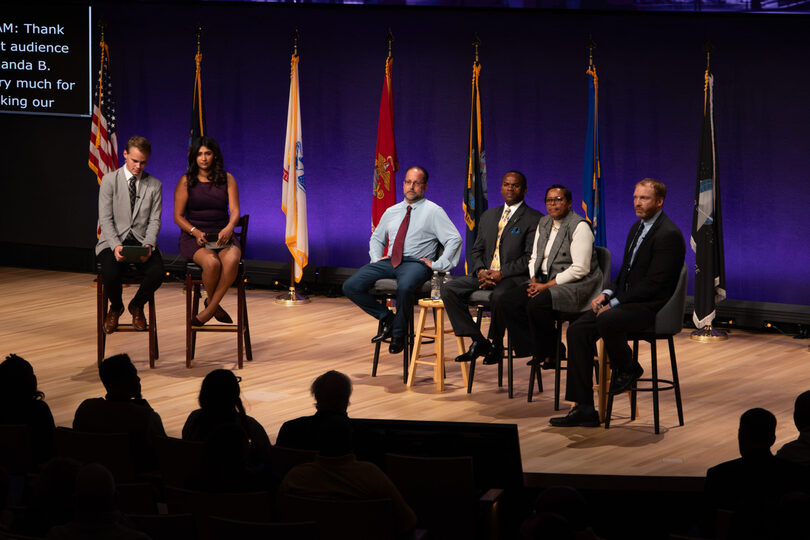SU community questions steer mayoral conversations on poverty, public safety

Questions from the SU community steered conversations on various issues at Monday’s on-campus mayoral debate hosted by CitrusTV. The student-led debate featured the four candidates: Sharon Owens, Tom Babilon, Alfonso Davis and Tim Rudd. Avery Magee | Asst. Photo Editor
Get the latest Syracuse news delivered right to your inbox.
Subscribe to our newsletter here.
Syracuse mayoral candidates sat across from Syracuse University students, faculty and community members in a Monday evening debate, answering audience questions about public safety, food insecurity and federal policy.
Hosted by CitrusTV at SU’s National Veterans Resource Center, the debate welcomed Syracuse Deputy Mayor and Democratic candidate Sharon Owens, Republican candidate Tom Babilon and independents Alfonso Davis and Tim Rudd.
Over 100 participants were invited to submit their questions before the debate.
Several SU students said they had hoped to hear candidates discuss environmental concerns and responses to the United States Immigration and Customs Enforcement raids.
Eric McCormick, a senior broadcast and digital journalism major from Liverpool, said after the “No Kings” protest on Oct. 18, and several national ICE protests, he was interested to see what candidates would say about the public’s response to President Donald Trump’s administration.
“A lot of the people who are here or who are listening to this debate might want to know more about what (the mayors) are going to do to protect them and their families,” Gabriela Peniston, a senior journalism student, said.
CitrusTV moderators Luke Radel and Anjana Dasam screened the audience questions and selected which would be included. Selected participants were invited to approach the microphone and read their questions to the candidates.
Candidates had one minute to answer questions, 30 seconds to rebut each other and 30 seconds for follow up questions from the moderators. Radel started the debate by encouraging attendees to be enthusiastic, and invited each candidate to share a 90-second introduction.
The opening question, submitted by Truman C. asked candidates how they planned to get SU students more involved in local politics.
First to answer, Davis said students should understand how the city government works, as living in Syracuse for over half a year means they’re directly affected by it. Rudd and Babilon agreed that students are responsible for finding opportunities to engage with the community and government.
Owens said the best part of her time as an SU student was when she ventured into the community and got an internship in the city.
“You have to come into the community to apply your academic learning to the practical application of everyday people in this community,” Owens said. “The best way to do that is to walk down that hill.”
Several members of VOTE SU — a student-led voter initiative — who attended the debate said local elections can impact the SU community in several ways, including parking, housing and public safety. Members Ariam Meseret and Brianna Barragan said it’s important for students to know what’s going on in the city and vote in the upcoming election on Nov. 4.
Kaley Markovitz, another member of VOTE SU, said that as an environmental policies major she is always concerned about climate change and related policies. She added that her parents are also worried about lead levels in Syracuse water systems.
In 2024, city tests revealed that lead levels in Syracuse are more than double those found in Flint, Michigan and “significantly worse” than in Newark, New Jersey according to the National Resources Defense Center.
“We’re here for a short four years, and instead of staying in a bubble because sometimes it’s hard to bridge the gap to the community and Syracuse students, it’s important to be aware,” Barragan said.
Other students expressed concern over environmental issues within the university and the city of Syracuse. Arietta Hallock, an environment and society minor, said she was interested to see how candidates respond to questions about the I-81 viaduct project because of its environmental impacts.
The project, which includes tearing down the I-81 ramp over the 15th ward, a historically black Syracuse neighborhood, has raised concerns among those who say the demolition could expose residents to harmful chemicals.
Charles M. asked candidates how they plan to address food insecurity in Syracuse, and said the new grocery store in Syracuse’s Valley neighborhood is not a solution.
Davis agreed that one grocery store isn’t enough to fix the food deserts in Syracuse. Under his administration, Davis said he would focus on finding investors to come into the community and set up stores in areas affected by food insecurity.
Owens agreed, adding that urban gardening and farming also provides support. She said Syracuse zoning laws allow urban farmers to use vacant lots to provide local food sources. To support food security, Charles said he attended Syracuse’s community garden event for sustainable agriculture, where Rudd was the only mayoral candidate in attendance, he said.
.
“We need more gardeners, people who can take some seeds and some plants and cultivate life and show other people that life has value in this community,” Rudd said.
Charles, a convicted felon, said he is also a community mentee helping to address youth crimes in Syracuse.
Babilon thanked Charles for his community leadership but added that convicted felons may not be appropriate to mentor the city’s youth. He said he’s seen mentors selling drugs at Syracuse community centers.
In related questions about police restrictions and gun violence, Owens and Davis agreed young people are more likely to listen to reformed convicts because they are part of the local community.
Davis said he could vouch for this kind of community support after experiencing it firsthand growing up in Syracuse public housing. Owens said she would welcome and compensate anyone who wanted to restore the community.
A question from Pierco C., taken from the YouTube Livestream, asked candidates about stricter regulations on Syracuse landlords who have not opted to solve property violations despite their tenants living in poor housing conditions.
Babilon said the city should take properties away from landlords who do not meet regulations instead of only implementing fines. He also said that educating tenants on their rights, such as working plumbing and electricity, is also important.
Davis said his administration would make sure people in Syracuse own these properties, so the city can create more of a capital investment for homeowners. Similarly, Owens agreed landlords have a responsibility to their tenants, and she wouldn’t shy away from taking landlords to court, she said.
A homeowner himself, Babilon stressed the importance of a “symbiotic relationship” between landlord and tenants.
Leandra Hernandez, an SU freshman, said the debate did a good job covering a wide range of topics, though she wished the moderators had asked candidates to specify in some of their responses. For example, when candidates said connecting people who experience homelessness with resources, she said she wanted to know what those resources were.
“A lot of them didn’t elaborate, and I feel like specifying how exactly they’re going to do that really helps establish more credibility for students who don’t know a lot about Syracuse,” Hernandez said.
Other discussion topics included mental health resources and the new city of Syracuse School District superintendent, Pamela Odom — who all four supported. Candidates also spoke about the current mayor Ben Walsh’s administration.
Rudd, Davis and Babilon said they were disappointed by Walsh’s leadership. Rudd and Babilon cited “mismanagement” and poor financial decisions as their reasons. Owens, who works directly with Walsh, said it’s “important to acknowledge when mistakes are made.”
Another attendee, Ali S., asked candidates how they planned to work alongside the Trump administration. Davis and Owens agreed they would work with U.S. Sens. Chuck Schumer and Kirsten Gillibrand because they serve as immediate contacts to the administration.
“Unfortunately, under this current administration, we get funding that comes from the federal government, whether it’s to serve people or to help our infrastructure, we cannot exist without that money,” Owens said.
Davis said he would continue to “invest in his vision,” supporting small business and bringing back capital investment in the city.
In a follow-up question, Radel asked Alfonso about comments he made in May about the assasination attempt on Trump in Butler, Pennsylvania. Davis posted on Facebook, saying he believed the attempt was a ”set up.”
Davis said he “stands on” what he said, citing his experience as a licensed gun owner as credibility. He said he did not think Corey Comperatore, the man who was killed in the incident, was part of the set up.
Rudd said “democracy is at risk” under the Trump administration. He said he is not running a traditional campaign, putting guard signs up or asking for donations, because he believes his actions as mayor will be more important.
In response, Babilon said New York state’s senators are in the minority and he wouldn’t insult the Trump administration when federal funds are at risk.
Owens emphasized the importance of the city’s diversity, adding that the Syracuse City School District has students who speak almost 80 languages.
“That is a demonstration of the best of who we are, the diversity of who we are. This administration clearly does not appreciate that or respect that,” Owens said. “The balance is going to be not sacrificing who we are.”





